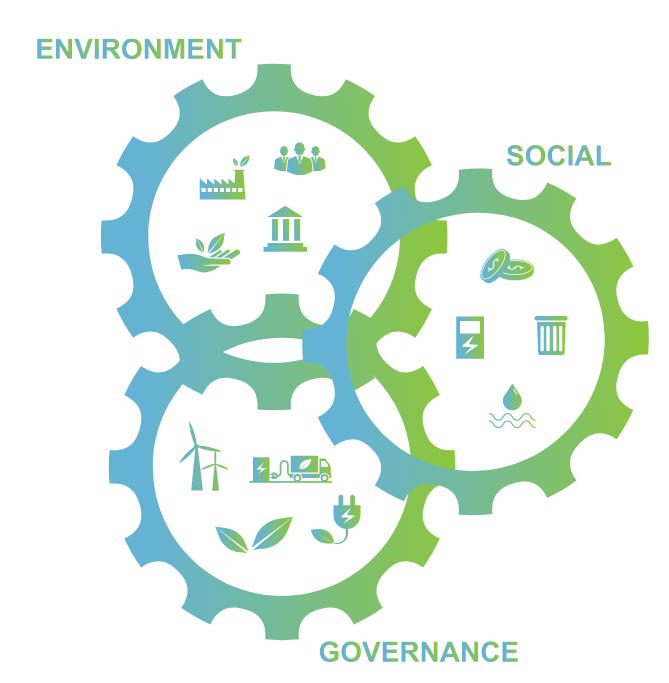Our Values
SBI Card values symbolize what is significant to us as an organisation and how we ensure that each of our employees are working towards the same goal and share a bigger purpose.
Our Mission
We're committed to building a more inclusive, responsible business focused on having a positive impact on the world around us. Sustainability is at the core of our business and everything that we do. We continue to ensure that the environment, social and governance risks are prioritized and embedded into our company-wide policies and frameworks to have the right level of governance on such issues.
"SBI Card continues to be data-driven, to not only ensure that our approaches and methodologies are as robust and relevant as possible. Both from the perspective of planet and people, we want the impact of our company and its ecosystem to be positive. Since our inception, we have been a trusted steward to our clients and communities, and we will continue with our relentless efforts to have a more profound impact on our surroundings and everything else that we are a part of."
- Managing Director and Chief Executive Officer, SBI Card

- Climate Change
- Waste Reduction & Recycling
- Energy Consumption
- Colleague Health & Safety
- Inclusion & Diversity
- Colleague Attraction & Retention
- Consumer Financial Protection
- Employee Learning & Development
- Employee Engagement& Welfare
- Business Ethics
- Anti Corruption & Bribery
- Risk Management & Compliance
- Responsible Digitalization
- Responsible Selling Practices
- Innovative Technologies & Products
- Data Privacy & Security

ESG Goals
- Reduce Scope 2 emissions by 50% by FY 2027 (Baseline FY 2019) and achieve carbon neutrality by 2030
- Digitize 85% of welcome kits thereby reducing paper usage by FY 2027
- Give Rs. 50 Crores contribution to environment initiatives by FY 2029
- Adopt recycle plastic cards and increase its volume to 25% by FY 2030
- Increase the proportion of women in permanent employees to 29% by FY 2027 and 35% by FY 2029
- Improve diversity by increasing PwD workforce’ proportion in permanent employees to at least 1% by FY 2027
- Transform the education of 1 lakh individuals by FY 2027 and 5 lakh individuals by FY 2030 through Corporate Social Responsibility (CSR) programmes.
- Providing quality health care services to at least 50,000 individuals by strengthening health infrastructure by FY 2027
- Enhance Data Privacy Standards across all operations
- Establish value chain’s ESG assessment process aiding vendor selection process by FY 2025
- Link ESG performance with executive compensation by FY 2030
ESG Governance
Board Level Corporate Social Responsibility & ESG Committee comprising of the Board of Directors overseeing ESG performance
Management Level Sustainability & Business Responsibility Committee comprising of Managing Director & CEO along with other senior management Personnels to provide oversight, ensure effective implementation of ESG and approve all ESG strategic initiatives
ESG Working Team - responsible for Business Responsibility & Sustainability policy implementation and execution of sustainability initiatives
We are cognizant of our responsibility to contribute towards protecting the planet. We are committed to minimize our organisation environmental footprint and promoting initiatives that contribute to national and international ESG (Environmental, Social and Governance) ambitions. Environmental management is an important part of our business strategy, risk management, value chain activities, operations and employee training. We aim to ensure that, in line with our efforts to support national and global sustainability targets, we are committed to the following:
Energy management
- We are procuring products that are energy efficient, recycled and environment-friendly
- Taking the necessary initiatives and putting appropriate controls in place to monitor and reduce our energy consumption within our operations
- Adopting energy-efficient operating procedures in our operations across facets such as facility management, travel, etc.
- Increasing the share of renewable/clean energy in our overall energy consumption
- Making people aware of how important it is to conserve energy, use energy sustainably and switch to renewable or clean energy across our value chain
Climate change management
- Tracking and reducing our greenhouse gas (GHG) emissions (i.e., scope 1, 2 and 3 emissions) year on year
- Establishing a strong management system to assess climate risks and opportunities and to taking appropriate actions
Water and Waste management
- Complying with legal requirements regarding waste (hazardous & non-hazardous) generation, management and disposal regulations
- Reducing waste generation and seeking to minimize the waste we send to landfills
- Monitoring, measuring and reporting on waste management practices while following recognized national and international guidelines
- Promoting reuse and recycling, as well as the use of supplies that are recycled and recyclable, and whose production and use minimize the consumption of natural resources
- Spreading awareness and influencing our business partners about best waste management practices across all value chains
- Promoting water conservation and judicious use of water in our operations, through measures to reduce consumption and maximize reuse
SBI Card recognizes its duty to protect employees from the risk of harm in the course of day-to-day business activities.
Our commitment
SBI Card commits to ensure health and safety of it’s employees, contractors, customers and suppliers by providing and maintaining a safe working environment and comprehensive wellness measures. At SBI we will:
- Demonstrate proactive leadership in health and safety matters and ensure that employees at all levels take responsibility for health and safety as part of their day-to-day role
- Be compliant with all legislative requirements of health and safety
- Proactively identify health and safety hazards and introduce appropriate controls to reduce risks relating to our operations
- Ensure that adequate Health and Safety information, instruction, training and supervision are provided to all employees, relevant to their role and responsibilities
- Maintain emergency, fire protection, security systems and facilities to protect employees and property of the organization
- Ensure that risk assessments are being carried out on regular basis to identify, assess and control any known or potential Occupational Health and Safety (OHS) related risk to employees and visitors
- Provision of first aid/medical treatments in case of accidents
Responsibilities
The Leadership team at SBI Card has overall accountability for all health and safety issues and responsibility to ensure that Health and Safety Standards are duly implemented. Further, it is also important to recognize that all SBI Card employees have a responsibility for health and safety in their day-to-day activities and for promoting a positive health and safety culture within the organization. Employees must attend safety training programmes, familiarize themselves with the commitment and report all accidents, incidents, dangerous occurrences, and hazards as soon as possible. SBI Card is personally committed to the effective delivery and continual improvement of health and safety standards and believe that a strong health and safety culture ensures business sustainability.
Measure the Impact of your activities on the Environment..
Measure your Carbon Footprint!
"Carbon Footprint is an important means to understand the impact of our behavior on global warming. According to WHO, a carbon footprint is a measure of the impact our activities have on the amount of carbon dioxide (CO2) produced through the burning of fossil fuels and is expressed as a weight of CO2 emissions produced in tons.
All of us can track our personal carbon footprint and put our individual efforts that can effectively contribute to stop global warming. If you haven’t started yet, begin now. Use our Carbon Footprint Calculator to know yours.. “
Household Consumption
Personal Conveyance
Public Transport
Result
| Particulars | Emissions per month (in Tonnes) |
Percentage |
|---|---|---|
| Emission from Household | ||
| Emission from Personal Conveyance | ||
| Emission from Public Transportation | ||
| Total Emissions |
Disclaimer:
The information provided on this webpage has been sourced from various reliable sources. We do not guarantee the authenticity of information provided on this page. The information on this page is only indicative and may be modified at any time without notice.
Sources:
https://ghgprotocol.org/sites/default/files/Emission_Factors_from_Cross_Sector_Tools_March_2017.xlsx https://www.ipcc-nggip.iges.or.jp/public/gp/bgp/2_1_CO2_Stationary_Combustion.pdf https://cea.nic.in/wp-content/uploads/baseline/2020/07/user_guide_ver14.pdf https://indiaghgp.org/sites/default/files/Road%20Transport%20Technical%20Paper.pdf https://www.epa.gov/system/files/documents/2022-04/ghg_emission_factors_hub.pdf https://indiaghgp.org/sites/default/files/Rail%20Transport%20Emission.pdf

